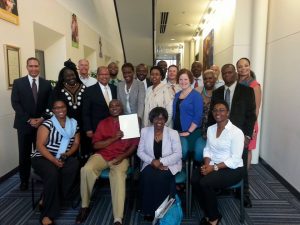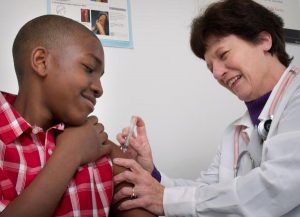
By Christine Kukka
For years, public health advocates have struggled to educate both doctors and Asian-Americans about the high risk of hepatitis B that this ethnic group faces. It’s been a slow, uphill battle marked by moderate success.
Despite the fact that one in 12 Asian-Americans and Pacific Islanders (AAPI) is chronically infected with hepatitis B, more than two-thirds of them haven’t been screened and don’t know they’re infected.
But another group of immigrants and their children—from Sub-Saharan Africa—are also at high risk of hepatitis B and have received even less attention from public health advocates and the medical community across the U.S.
Of foreign-born U.S. residents with hepatitis B, about 58 percent are AAPIs and 11 percent come from Africa. In the past 20 years, the number of immigrants–primarily from war-torn Somalia, Nigeria, Ethiopia, Ghana, Kenya, and Egypt–have increased more than 750 percent. There are now 1.6 million African immigrants in the U.S. and 10 percent are believed to be infected with chronic hepatitis B.
In the largest study of its kind, 955 African-born residents living in New York City were screened for hepatitis B between 2011 and 2013. Doctors found 74 percent had been infected with hepatitis B in the past, and 9.6 percent had current, chronic or long-term infections.

“I believe African immigrants have been underserved by our healthcare system,” observed Ponni V. Perumalswami, MD, assistant professor of medicine and director of the Hepatitis Outreach Network (HONE) at Mount Sinai School of Medicine in New York City and lead researcher of the New York City study. “Similar to Asian-Americans, African immigrants are often not screened or referred to treatment. Additionally, many at-risk African immigrants are not currently engaged in health care and have struggled to access medical care in our communities.”
Healthcare providers have struggled for decades to provide the resources and culturally-competent care needed to screen, immunize and refer infected AAPIs for treatment; now they must develop new strategies to reach African immigrant communities. These communities, found in large cities such as Atlanta and New York and in small towns such as Lewiston, Maine, have a wide array of distinct cultures, healthcare practices and languages.
![A young Somali refugee. Courtesy of USAID (USAID) [Public domain], via Wikimedia Commons.](https://www.hepb.org/blog/wp-content/uploads/2016/08/512px-Little_Somali_girl-2-256x300.jpg)
She is now testing a group education program—called the Hepatitis Outreach NEtwork (HONE)–that could be adapted nationwide to raise awareness about hepatitis B. HONE enlists local public health agencies, community organizations, health care providers and community leaders to reach African immigrant communities. She also recommends using patient navigators from each immigrant African ethnic group to help people get screened, immunized and into treatment. “Not every person needs a patient navigator, but they can be very effective in getting some people screened and those infected linked to care,” she said
But for many, this outreach is too little too late. “Unfortunately, it is not uncommon for me to see patients who have been silently infected for decades with advanced liver cancer or suffering from complications of liver failure when we diagnose their hepatitis B infection for the first time,” she said.
That lack of screening and treatment continues to haunt AAPI communities. Vietnamese-American men whose infections were not diagnosed until it was too late make up a large percentage of people with liver cancer in the U.S.

“It’s particularly troubling as we have a highly effective vaccine to
prevent hepatitis B and highly effective treatments to decrease the risk of liver cancer and liver disease progression,” Perumalswami commented.
In an effort to raise awareness about hepatitis B and C and HIV in the African immigrant community, a coalition of organizations, including the Hepatitis B Foundation and Hep B United, and local and national groups are supporting National African Immigrant and Refugee HIV/AIDS and Hepatitis Awareness Day (NAIRHAA Day) on Sept. 9.
A Twitter chat exploring ways to raise awareness among African immigrants in the U.S. is scheduled for 2 p.m. (EST) Tuesday, Sept. 13. Use hashtag #AIHHchat
For more information about NAIRHAA, including webinar training for healthcare providers and public health officials, please explore the following:
Facebook: https://www.facebook.com/NAIRHHA
Twitter: @NAIRHHADay
Thunderclap: http://thndr.it/1IQC4TB
Webinar training on Improving Hepatitis B Screening and Care Among African Immigrants (June 2016): https://www.youtube.com/watch?v=ixyelHdVPh4
Webinar 1 (Epidemiology) https://www.youtube.com/watch?v=RWYGgyNSIK8
Webinar 2 (HIV) https://www.youtube.com/watch?v=T0LOybRvjNw
Webinar 3 (Hepatitis B) https://www.youtube.com/watch?v=g47Dm3rV4-Y
For more information, contact Siede Slopadoe, lead organizer for NAIRHAA Day, at sslopadoe@mac-boston.org

